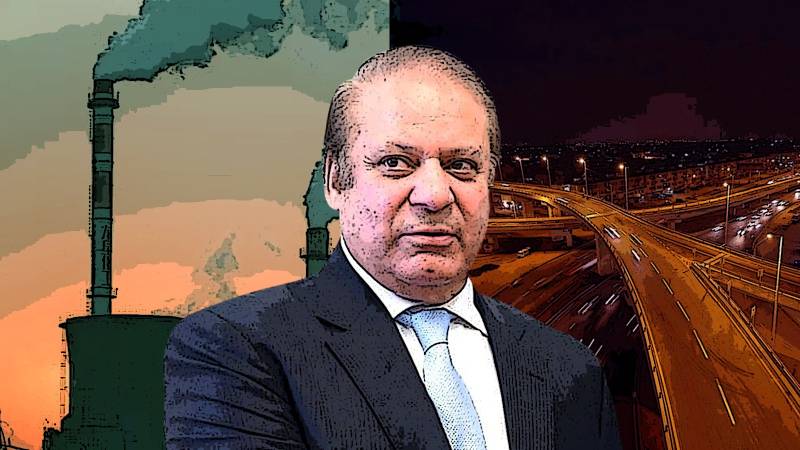
During the 1970s and 1980s, Punjabi cinema and PTV dramas boldly depicted the atrocities committed by feudal lords against the common people – called the ria’ya – on their estates. These feudal lords were often perceived as loyal to the British colonial masters, who had granted them significant favors in exchange for their unwavering loyalty and exceptional services, as may also be seen in Shaukat Siddiqui’s masterpiece novel, Jangloos.
This anti-feudal narrative paved the way for urban businessmen to enter politics, with Nawaz Sharif taking the lead. The urban middle class, historically resentful of feudal politicians, readily aligned themselves with their urban counterparts – the nouveau-riche.
As detailed in one of my previous articles, urban voters favoured men in suits over those donning traditional kameez shalwar and waistcoats – the rural landlords. Their exit from power had a political logic too. Most of the feudal politicians were close to Zulfiqar Ali Bhutto. After General Ziaul Haq took over, they readily aligned themselves with the new order. This sailed smoothly until they started showing resistance to the military regime under Mohammad Khan Junejo’s premiership in 1985, and until Zia-ul-Haq had found Nawaz Sharif, with an ability to pitch the urban business class against the formerly ruling feudal elite.
Traditionally, feudal politicians exhibited haughtiness and a reluctance to socialize with ordinary people. Their merrymaking activities were also confined to their distantly located rural villas. They were mostly liberal in their outlook and harbored moderate religious attitudes. The financial orientation was also aristocratic, as they refrained from engaging in the collection of small favors and kickbacks associated with development contracts. They focused primarily on larger-scale projects, on expanding their landholdings or establishing substantial factories, often securing substantial loans from banks, often with little intention of repayment. Their opulent lifestyle led the educated, urban middle class to disdain them, attributing this to their close connections with the British colonial masters. This narrative made their exit from power easy for the establishment, during the Zia-ul-Haq regime.
The businessmen politicians found themselves wielding political influence within their respective domains. By pledging their allegiance and services to the party, they gained the ability to influence government decisions when these did not align with their personal interests. They could evade taxes, consume electricity and gas without paying their bills, and encroach upon government lands with their shops and factories, all without fear of legal repercussions or enforcement.
Conversely, urban businessmen introduced something entirely new and unexpected to society and politics.
The businessmen politicians found themselves wielding political influence within their respective domains. By pledging their allegiance and services to the party, they gained the ability to influence government decisions when these did not align with their personal interests. They could evade taxes, consume electricity and gas without paying their bills, and encroach upon government lands with their shops and factories, all without fear of legal repercussions or enforcement. Over time, their power consolidated to the point where they became an unassailable force, forming the bedrock of PML-N's support.
In the midst of all this, Imran Khan's PTI capitalized on the space left empty by the traditional feudal political class, notably exemplified by the Pakistan People's Party, which struggled to retain its voter base for well-known reasons. PTI brought the educated and professional middle and working classes, encompassing both urban and rural segments, into the realm of politics.
This contractor-politician-civil servant alliance gave rise to a significant number of nouveau-riche individuals – often referred to as the new rich or upstarts – and hence a culture of exhibitionism. Their lifestyle and social conduct dismayed the working and lower middle classes in adapting to these societal changes. Essentially, what was once confined to the distant rural lands, within the walls of the feudal lords’ bungalows, became evident in nearby cafes and suburban farmhouses, thereby tearing the overall moral and cultural fabric of society apart.
In the midst of all this, Imran Khan's PTI capitalized on the space left empty by the traditional feudal political class, notably exemplified by the Pakistan People's Party, which struggled to retain its voter base for well-known reasons. PTI brought the educated and professional middle and working classes, encompassing both urban and rural segments, into the realm of politics. The PML-N had long left this segment of the society distressed and outside of their political narrative. However, PTI leadership’s handling of politics, their relentless welcome of all fallen angels into their folds, paid back badly. Looking back, one can tell, their voices were too loud, too out of tune, for certain ears. It is evident from the way old dried leaves have fallen from their tree, making the return of Nawaz Sharif to the country and back into politics possible, rather easy.
Nawaz Sharif's grand rally at Minar-e-Pakistan upon his return to the country on the 21st of October 2023, despite facing significant challenges, in the eloquent words of George Orwell, deems him a man 'more equal than others,' openly confronting all odds. His entire speech can be summarized as follows: 'I am an honorable gentleman. I strictly adhere to high moral standards. I have no intention of pursuing any vendettas – simply reinstate me in the Prime Minister's office, and I shall conduct myself with utmost decorum.'
Nevertheless, regardless of the positive optics, notwithstanding the political acumen attributed to his return, and irrespective of how auspicious his prospects may appear, the imprisoned PTI chairman serves as a perpetually dangling sword in the hands of the establishment, ready to be unsheathed the moment Nawaz Sharif chooses to defy them. The task of reinstating the PML-N to power amid daunting economic challenges is an entirely distinct matter. It remains an open question how treacherous the path may be, one they have, nonetheless, chosen to tread.
Meanwhile, in the posh sectors of the capital city, a subtle shift is underway.
These violent delights have violent ends. ---- Shakespeare

